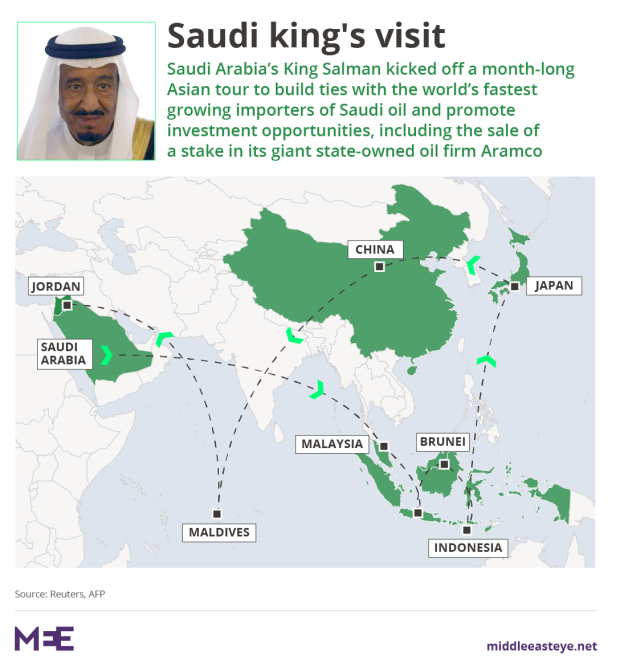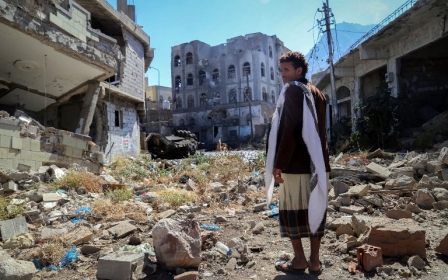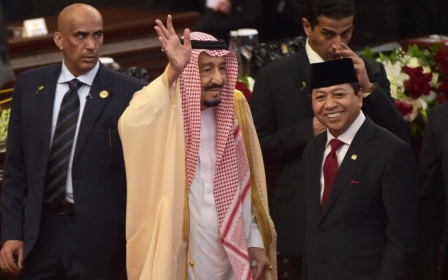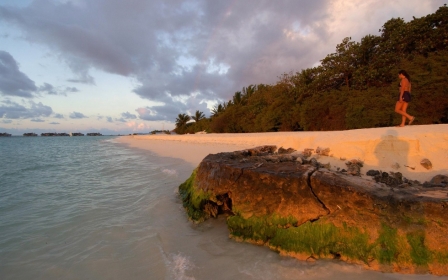Sovereignty for cash? The Saudi-Maldives island deal making waves
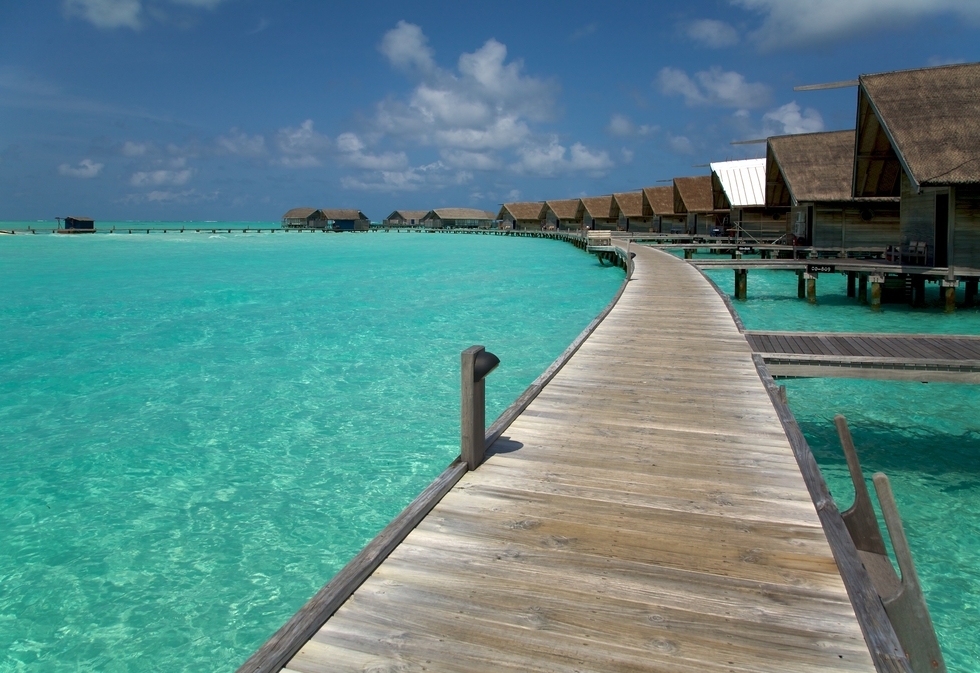
It’s one of the world’s top tourist destinations, with more than a million scantily clad foreigners enjoying its glistening white beaches and crystal clear waters each year.
Later this month, the Indian Ocean state of the Maldives – particularly popular with honeymooners – is scheduled to play host to a very different kind of visitor when King Salman bin Abdul Aziz of Saudi Arabia arrives for official talks and a holiday.
Top of the agenda in talks with the government in Male, the Maldives small, cramped capital, is likely to be a $10bn Saudi investment project, believed to include the Saudi purchase or long-term lease of a string of 19 of the island state’s coral atolls.
While refusing to disclose details of the deal, President Abdulla Yameen of the Maldives says the project will include “international sea sports, mixed development, residential high-class development, many tourist resorts, many airports and other industries".
The opposition Maldives Democratic Party (MDP), led by former president Mohamed Nasheed - now living in exile in Britain – expressed outrage at the plans.
“No information on the proposed project has been shared with the public,” said an MDP statement. “The plans would allow a foreign power control of one of the country’s 26 atolls. It amounts to creeping colonialism.”Meanwhile, concern has been raised among an estimated 4,000 people who might be threatened with being relocated from their homes if the sale of the atolls to the Saudis goes ahead. A demonstration was recently broken up by police. Police also raided a group allegedly planning a protest during the Saudi king’s visit.
The flattest country on earth
There are also fears that the development, with its large-scale building work and dredging activities, will threaten irreparable damage to what is one of the world’s most pristine but vulnerable ecological regions.
The Maldives, composed of more than 1,200 coral islands, is the flattest country on earth. Scientists warn that with climate change and rising sea levels, there is a very real possibility that the majority of the island nation’s land area will be underwater by the end of the century.
To publicise the problems being caused by climate change, former president Mohamed Nasheed at one point staged a cabinet meeting underwater
Former president Nasheed – ousted from power in 2012 in what he says was a coup and sentenced in absentia to 13 years in prison – was, during his time in office, a strong advocate of taking action on climate change, calling on the international community to safeguard the future of his country.
To publicise the problems being caused by climate change – and the damage being done to the Maldives’ coral reefs by warming seas – Nasheed at one point staged a cabinet meeting underwater.
Abdulla Yameen, the current president – who has strongly denied allegations about government corruption made recently by the Qatar-based Al-Jazeera network - has stressed the need for economic growth and sees the giant Saudi investment as key to future prosperity.
“We do not need cabinet meetings under water,” says the government. “We need development.”
Ever closer ties
Saudi Arabia and the Maldives - a predominately Sunni Muslim country with a population of just under 400,000 including about 100,000 foreign workers - have established ever closer ties in recent years.
The opposition says part of the rational behind the multi-billion dollar Saudi development could be a plan by Riyadh to establish a staging post and special economic zone, complete with port facilities, for oil and gas exports to Asia, particularly to China.
The Maldives, heavily dependent on tourism and having to import 90 percent of its food, is in serious economic trouble. In 2013, the Saudis granted a "soft loan" of $300m to the islands.
The Saudis have pledged to build what they describe as 10 'world class' mosques in the archipelago
Islam in the Maldives has traditionally blended elements of Sufism and other religions; in recent years, a stricter form of Saudi-style "Wahhabism" has predominated. There are concerns that a number of people from the Maldives are believed to have joined the Islamic State (IS) group in Syria and Iraq.
In late 2015, a woman who confessed to adultery was, for the first time in the Maldives, sentenced to death by stoning.
The Saudis have pledged to build what they describe as 10 "world class" mosques in the archipelago and have donated $100,000 for scholarships to study in Saudi Arabia.
President Yameen has made several visits to Saudi Arabia. In 2015, the Saudis established an embassy in the Maldives. In early 2016, the government in Male cut diplomat ties with Iran saying policies Tehran was pursuing in the Middle East were detrimental to peace in the Indian Ocean.
In 2015, the Saudis established an embassy in the Maldives. In early 2016, the government in Male cut diplomatic ties with Iran saying its policies in the Middle East were detrimental to peace
Increasing numbers of Saudis are visiting the Maldives. In early 2014, then Prince Salman is reported to have spent $30m on taking over three island resorts in the Maldives for a month, much to the consternation of tourists who were said to have had their holidays cancelled.
Deputy Crown Prince Mohammed bin Salman, the politically powerful Saudi defence minister, threw a lavish birthday party on the islands in mid-2015. The singer Shakira and rapper Pitbull are said to have been among those invited.
The growing ties between Riyadh and Male have been causing some concern in the region, particularly in India.
Last year the Binladin Group, the troubled Saudi construction conglomerate, was awarded – for an undisclosed sum – a contract to build a new international airport in the Maldives.
A previous agreement with an Indian company to build the airport was terminated; it is likely the Maldives will have to pay millions of dollars in compensation.
Push to Asia
The visit of the Saudi king will come at the end of what has been described as Riyadh’s biggest ever diplomatic initiative in Asia, with stops in Malaysia, Brunei, Indonesia, Japan and China before touch down on the coral islands of the Indian Ocean.
Analysts say the Asia trip is about extending Saudi influence and diversifying the Kingdom’s economy away from oil and gas and investing in the region.
Saudi’s rulers do not believe in travelling light. The royal entourage – believed to number 1,500 – includes 25 princes and 10 ministers, flown about on six Boeing passenger jets, with an additional military transport plane carrying 500 tonnes of luggage.
The lavish logistics of the trip have attracted considerable publicity with reports of hotels and limousine companies struggling to cope in the countries concerned.
When the Saudi delegation makes its last stop in the Maldives, the government in Male is hoping for a much needed boost to its economic fortunes.
The opposition warns of an imminent loss of sovereignty and more environmental problems in a country viewed by many as a tourist paradise.
Kieran Cooke is a former foreign correspondent for the BBC and the Financial Times, and continues to contribute to the BBC and a wide range of international newspapers and radio networks.
The views expressed in this article belong to the author and do not necessarily reflect the editorial policy of Middle East Eye.
Photo: Cocoa Island in the Maldives (Wikimedia)
This article is available in French on Middle East Eye French edition.
New MEE newsletter: Jerusalem Dispatch
Sign up to get the latest insights and analysis on Israel-Palestine, alongside Turkey Unpacked and other MEE newsletters
Middle East Eye delivers independent and unrivalled coverage and analysis of the Middle East, North Africa and beyond. To learn more about republishing this content and the associated fees, please fill out this form. More about MEE can be found here.



